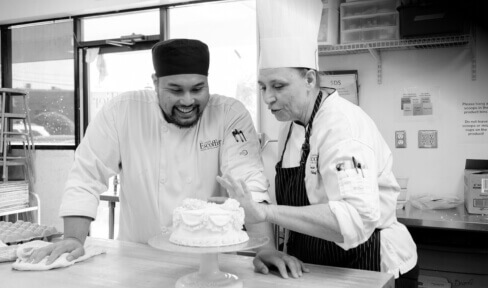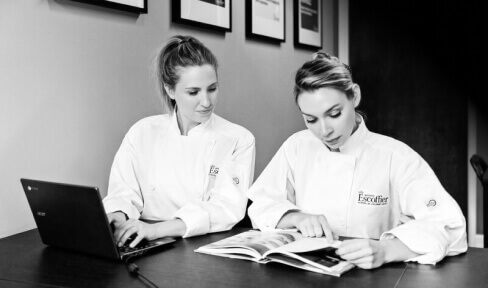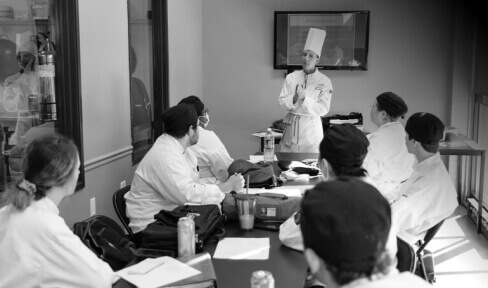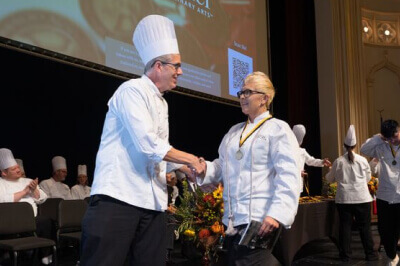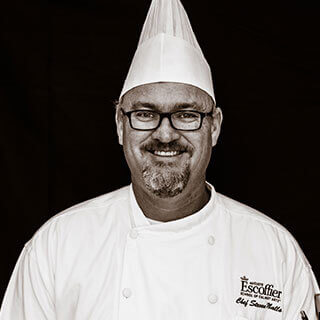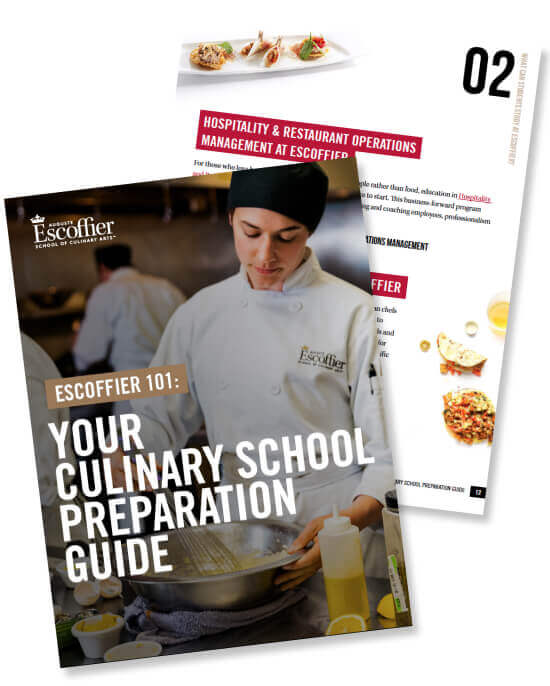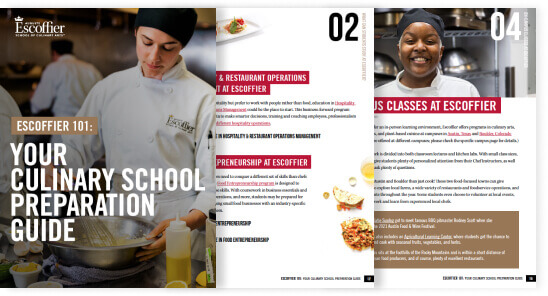The Culinary Career Survey shows you how your unique talents and interests might align with different culinary careers.
COLORADO On-campus
CULINARY ARTS PROGRAMS
Train with professional Chef Instructors at one of the best culinary schools in Colorado.*
*2024 Best Colleges for Culinary Arts in Colorado (#1 in Colorado, #3 nationally), Niche
Overview
A Colorado Culinary School with a National Reach
With 4 kitchens, 6 classrooms, and a diverse group of professional Chef Instructors, Escoffier’s Boulder campus culinary arts programs can help you launch your dream career.
The curriculum covers food history, cooking techniques, business principles, and more, providing you with a foundational culinary education that can make your resume stand out and help to set you apart.
Boulder, Colorado has a vibrant food culture, with access to local ingredients and a strong emphasis on sustainability. The 6-week Farm To Table® Experience can help you learn about local procurement, agricultural practices, and the importance of sustainable and ethical ingredient selections.
Learn more about the programs and courses, what careers graduates can work towards, and how a degree or diploma could set you apart.
Other ways to study with Escoffier:
The Colorado Restaurant Industry At a Glance*
#5 in the USA
Colorado ranks fifth in the nation in number of restaurants per capita.
80% of Restaurant Owners
started out in an entry-level position.
11% of Colorado’s Workers
Colorado restaurants employ more than 303,000 people.
*The Colorado Restaurant Industry in 2023, Colorado Restaurant Association
complete your training in
30‑60 weeks
Escoffier’s Boulder culinary arts programs offer training in business and kitchen skills. Gain practical career training and earn a diploma in a little more than half a year or a degree in a little more than a year.
GRANT OR SCHOLARSHIP AID
56%
The percentage of Escoffier Boulder students who received an income-based federal Pell grant and/or a grant or scholarship from another source, according to the National Center for Education Statistics.
Average federal STUDENT Loan Award
$11,125
For all students, the average amount of aid awarded in the form of federal student loans in 2021-22 was $11,125, according to the National Center for Education Statistics.
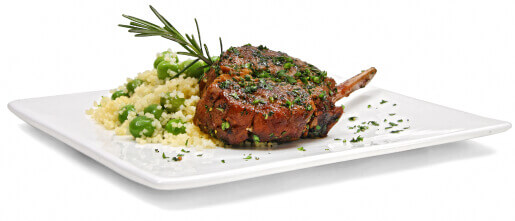
Courses
Cooking Classes in Boulder Designed to Prepare You to Thrive as a Professional
Our Boulder campus curriculum is designed to help you pursue your dream job in the culinary arts.

Escoffier provides you with a comprehensive curriculum, emphasizing kitchen skills, business skills, sustainable practices, and hands-on learning.
You can receive a holistic education that not only delves into the essentials of culinary arts, but also places a significant emphasis on sustainability and the principles of farm-to-table dining. Boulder’s vibrant food culture and access to locally-sourced ingredients can provide you with the perfect backdrop for hands-on learning and culinary exploration.
Become a graduate to prepare yourself for the competitive culinary world… you can be equipped with the knowledge, skills, and connections that can help you excel throughout your career.
- Professional training facility at our Escoffier Boulder, Colorado campus
- Work side-by-side with our Boulder Culinary Chef Instructors
- Get culinary arts job search, interview, and career preparation assistance
- Access to alumni mentorship and employer partner network
Culinary Foundations
The Culinary Foundations class begins with course work concentrating on food safety and sanitation in the professional kitchen. The class focuses on the importance of proper hygiene, food handling, food storage, cleaning, pest control and HACCP in a food service operation are explored.
Additionally, the historical background of the culinary arts profession is studied, and students will gain an introduction to the professional kitchen by tracing the origin of classical cuisine and gaining an overview of the development of modern foodservice. Students also start to become acquainted with tools, utensils, and equipment and discuss kitchen layout.
Basic cooking techniques, culinary terminology, equipment operation, the use and effect of heat, and seasoning principles are taught in this course. This course also includes fundamental knife skills, cutting techniques, and the concept of mise en place. Conversion methods and standard measurements, as well as yield cost analysis; portion sizing and food costing are covered.
Culinary Arts and Patisserie
In the Culinary Arts and Patisserie course, students build upon the foundations taught in Culinary Foundations. The course begins with an overview of breakfast cookery including classical American breakfast items such as egg cookery, quick breads, muffins, biscuits and breakfast meats.
Students will study the art and science of baking and pastry arts and learn to prepare items ranging from bakeshop staples to international restaurant quality desserts covering the theory and chemistry of the pastry arts. Cakes, tortes, icing and decorating techniques are also covered.
Charcuterie and Garde Manger are also covered in this course. Classic charcuterie includes items such as pâtés and terrines, and Garde Manger will cover buffet presentations and the preparation of hot and cold hors d’oeuvres.
World Cuisines
In this course, students will take an in-depth look at a variety of cuisines from around the world. Students will take a global journey by studying the classical cuisines of France and Italy, and exploring a variety of regional cuisines from Europe, the Middle East, Asia, and the Americas. For each region, students will learn about the history and culture of the people, key ingredients and cooking styles that characterize the cuisine, and how to produce some of the region’s signature dishes. This course will also prepare students for the workforce by teaching them how to research the dishes and flavors of a specific cuisine for any culinary venture.
Farm to Table® Experience
This course provides the students with a hands-on experience on a working farm/ranch or vineyard/orchard. The Instructor conducts the lecture and lab activities to coincide with the harvested item(s) for a catered event executed by the students. Students in the residential delivery of the course, under the direction of a Farmer/Rancher collect or harvest foods and/or proteins for the students’ lab activities.
This class also focuses on the ever-growing relationship between the chef and the farm/factory/ranch. This course will result in a daily lab menu production of selected sustainable and/or organic foods. Also presented will be concepts of traditional and nontraditional farming and sourcing for vegetables, as well as the impact of land and sea animal-based food sourcing as practiced globally.
Culinary Industry Externship I
This course provides opportunities for real life experiences in an operational restaurant or related business and builds on the skills and techniques covered in previous courses. Externship courses are specific to the area of program concentration and must be completed for each concentration in which a student is enrolled. Externship must be completed for each new program enrollment.
Restaurant Operations
Three out of five restaurants fail within five years of opening, often due to money mismanagement; this residential program course gives students the skills to not only keep their restaurant in business but also turn a profit. In this course, students study the hierarchy of management in food service, and the skills needed to succeed as a manager: training employees, motivating them, disciplining them, and creating a safe and positive work environment.
This course explores different types of menus (including both food menus and beverage menus) and their applications. Aspects of menu planning and design, ranging from visual design to price analysis to making use of available resources are covered.
Culinary Foundations
The Culinary Foundations class begins with course work concentrating on food safety and sanitation in the professional kitchen. The class focuses on the importance of proper hygiene, food handling, food storage, cleaning, pest control and HACCP in a food service operation are explored.
Additionally, the historical background of the culinary arts profession is studied, and students will gain an introduction to the professional kitchen by tracing the origin of classical cuisine and gaining an overview of the development of modern foodservice. Students also start to become acquainted with tools, utensils, and equipment and discuss kitchen layout.
Basic cooking techniques, culinary terminology, equipment operation, the use and effect of heat, and seasoning principles are taught in this course. This course also includes fundamental knife skills, cutting techniques, and the concept of mise en place. Conversion methods and standard measurements, as well as yield cost analysis; portion sizing and food costing are covered.
Business and Professional Communications
The Business & Professional Communications course emphasizes the principles and practical application of effective professional communication behaviors within professional, business, and organizational contexts. In addition to identifying the importance of effective communication skills to the hospitality industry, communication styles and effective listening methods are addressed.
Students will create and present oral presentations including cooking demonstrations, and special occasion speaking. Listening skills, verbal and nonverbal communication, conflict resolution, cultural differences in communication, and debate techniques are also covered.
World History and Culture from the Culinary Perspective
Throughout history, food has done more than just provide nourishment. From prehistoric times to the present day, food and the pursuit of it has had a transformative role in human history. Food has impacted societal organization, industrial development, military conflict, and economic expansion. As epicure and gastronome, Jean-Anthelme Brillat-Savarin stated, “Gastronomy governs the whole of human man.” In addition, food also serves a role in the cultural development of religion, economics, and politics. This course examines the role of food and its contribution and influence over history, culture, religion, economics, and politics. Food customs and attitudes are also explored, as well as, the social awareness selected food patterns and customs.
Culinary Arts and Patisserie
In the Culinary Arts and Patisserie course, students build upon the foundations taught in Culinary Foundations. The course begins with an overview of breakfast cookery including classical American breakfast items such as egg cookery, quick breads, muffins, biscuits and breakfast meats.
Students will study the art and science of baking and pastry arts and learn to prepare items ranging from bakeshop staples to international restaurant quality desserts covering the theory and chemistry of the pastry arts. Cakes, tortes, icing and decorating techniques are also covered.
Charcuterie and Garde Manger are also covered in this course. Classic charcuterie includes items such as pâtés and terrines, and Garde Manger will cover buffet presentations and the preparation of hot and cold hors d’oeuvres.
Foodservice Math & Accounting
Foodservice Math & Accounting introduces students to managerial accounting concepts and explains their applications to specific operations within the hospitality industry. Emphasis is placed on how to administer accounting procedures to minimize costs and maintain a full range of customer services.
After summary of the fundamentals of culinary math, an overview of basic business accounting transactions is covered including asset/liability accounts such as accounts receivable and payable, ledgers, balance sheets, payroll and financial statements.
Technical Writing for the Hospitality Industry
Technical Writing for the Hospitality Industry, prepares students to write in the hospitality and foodservice professions. In a professional setting, writing provides readers information they need in a format they can understand.
Unlike most academic writing, in which students demonstrate their learning to a professor who already knows the subject, in technical communication the writer is the expert, and the readers are the learners. In the hospitality and foodservice industries, students and professionals write a variety of documents for supervisors, colleagues, and customers such as explaining a problem or product, preparing a proposal, or illustrating a project. This course teaches students to adapt their writing to different audiences and purposes.
This course outlines strategies for making subjects clear to readers who need to understand them. To communicate effectively with an audience, writing must meet rigorous editing standards, in addition to writing in a clear, concise style and presenting information logically.
World Cuisines
In this course, students will take an in-depth look at a variety of cuisines from around the world. Students will take a global journey by studying the classical cuisines of France and Italy, and exploring a variety of regional cuisines from Europe, the Middle East, Asia, and the Americas. For each region, students will learn about the history and culture of the people, key ingredients and cooking styles that characterize the cuisine, and how to produce some of the region’s signature dishes. This course will also prepare students for the workforce by teaching them how to research the dishes and flavors of a specific cuisine for any culinary venture.
The Science of Nutrition
In the Science of Nutrition course, the basic principles of nutrition are investigated. Emphasis is placed on the nutrients, food sources, and their utilization in the body for growth and health throughout life. Contemporary and global nutritional issues are also discussed.
Culinary Entrepreneurship
This course is a culmination course in entrepreneurship. This course covers such topics as business planning, pricing, credit management, government regulation, legal concerns. Business ethics and the crucial role and importance of management and leadership are also covered. For the final project for this course, the student will complete and present a business plan for a food service operation.
Farm to Table® Experience
This course provides the students with a hands-on experience on a working farm/ranch or vineyard/orchard. The Instructor conducts the lecture and lab activities to coincide with the harvested item(s) for a catered event executed by the students. Students in the residential delivery of the course, under the direction of a Farmer/Rancher collect or harvest foods and/or proteins for the students’ lab activities.
This class also focuses on the ever-growing relationship between the chef and the farm/factory/ranch. This course will result in a daily lab menu production of selected sustainable and/or organic foods. Also presented will be concepts of traditional and nontraditional farming and sourcing for vegetables, as well as the impact of land and sea animal-based food sourcing as practiced globally.
Culinary Industry Externship I
This course provides opportunities for real life experiences in an operational restaurant or related business and builds on the skills and techniques covered in previous courses.
Externship courses are specific to the area of program concentration and must be completed for each concentration in which a student is enrolled. Externship must be completed for each new program enrollment.
Culinary Industry Externship II
This course provides additional opportunities for real life experiences in an operational restaurant or related business and builds on the skills and techniques covered in previous courses.
Externship courses are specific to the area of program concentration and must be completed for each concentration in which a student is enrolled. Externship must be completed for each new program enrollment.
Immerse Yourself in the Farm To Table® Experience
Escoffier gives you the opportunity to work directly with farmers, providing a real-life glimpse of agricultural methods and practices. Our farm partners open their lives, homes, hearts, and businesses to Escoffier students for a true Farm To Table® Experience.
Possible farm experiences and observations may include:
- Harvesting
- Livestock
- Dairy
- Planting
- Cheese making
- Biodynamics
- Permaculture
- Hydroponics
- Greenhouses
- Composting and preserving
An externship helps you gain the hands-on experience and practical training you need to prepare you to work as a culinary professional
An externship is essential to supplementing your classes and gaining the practical skills you need to thrive in your dream culinary job. You can complete your externship in a variety of venues, including resorts and spas, catering companies, food production companies, and many more. Your externship also can help you to network with experienced chefs and stand out in the culinary job market.
Request Information[Career Services department] sent over my application and my resume, and assisted me with setting up the [externship] interview. Within a week, I had an externship placement, and I was figuring out the logistics. That wouldn’t have even been a possibility for me if it had not been for the Chef Instructors and the support staff at Escoffier.”*
*This information may not reflect every student’s experience. Results and outcomes may be based on several factors such as geographical region or previous experience.
Cost & Time
Your Options to Help You Afford Pursuing a Career in the Culinary Arts
Most Boulder Escoffier students received financial assistance in 2021-2022.* Financial Aid is available to students who apply and qualify.
*54% of Boulder students who entered postsecondary education for the first time received some financial assistance in 2021-22 for those who applied and qualified, College Navigator, National Center for Education Statistics
Federal Financial Aid
Financial aid is available to students who apply and qualify. Get our student aid guide, or speak with a financial aid representative to learn more.
Scholarships and Grants
Learn about scholarships and
federal financial grants for
those who apply and qualify.
Military Benefits
Eligible active duty, veterans, and
their family members have specific grants available to help them reach their educational goals.
The average net price was $11,756 for grant or scholarship aid for students in the largest program for the time in academic year 2021-22.*
*College Navigator, National Center for Education Statistics
Associate of Occupational Studies Degree in Culinary Arts
Program Cost: $36,740†
Program Length: 60
weeks
Diploma in Culinary Arts
Program Cost: $18,094†
Program Length: 30
weeks
†Total program cost includes tuition and equipment & supplies. The Associate of Occupational Studies Degree in Culinary Arts cost also includes course packs. The cost of books is not included. Students may choose to purchase books when enrolling. For more cost details, see the catalog.
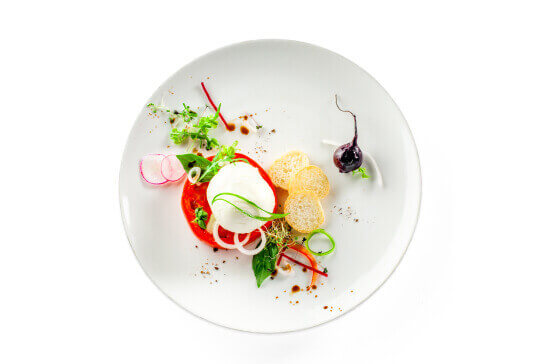
30 or 60
weeks
Academic weeks required to complete the degree or diploma program.
25
hours
Hours per week recommended for academics and school-related activities, depending on the student’s learning style.
10
minutes
Approximate time required to complete an online application. Apply today!
More Details
Gain Essential Hands-On Culinary Career Training in Colorado’s Sustainable Culinary Hub
The city of Boulder continues to push boundaries in it’s culinary practices. Explore how you can make the most out of your time studying in this dynamic city:
Food Truck Festivals
Boulder hosts food truck festivals, which can give you exposure to the food truck industry and a chance to experiment with mobile cuisine.

Shop at Local Farmers’ Markets
Boulder has vibrant farmers’ markets and artisanal food markets. You can visit these markets to source ingredients and connect with local producers.
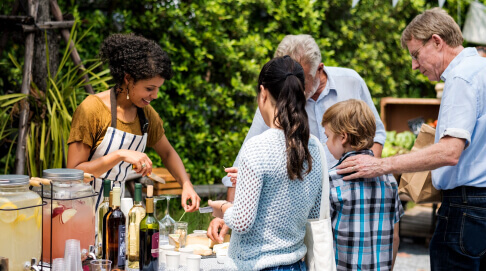
Sustainability Initiatives
Boulder’s commitment to sustainability extends to its food scene. The city regularly hosts events focused on sustainable cooking, reducing food waste, and environmentally conscious practices.
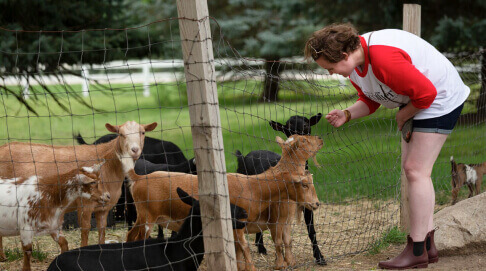
Enjoy Inspiring Natural Beauty
Boulder offers a wealth of outdoor recreational activities, which gives you the opportunity to balance your studies with exciting outdoor adventures.
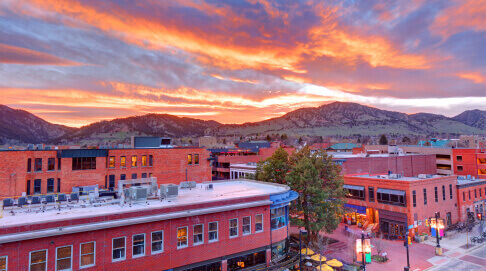
Looking to call Colorado home?
Escoffier Boulder students can choose from housing options that are comfortable and convenient
While we don’t provide on-campus student housing, we collaborate with selected housing provider in the Boulder, Colorado region. Culinary arts students in Boulder can select from apartment complexes to dorm-style lodgings. We’re here to help you find a home you love!
Need a place to live in Boulder?
Explore a variety of options from our select
housing partner.
The Escoffier Boulder Campus is Accredited and Respected Worldwide
The reputation of the institution where you earn your degree or diploma is an important measure of value. The Escoffier Boulder school is accredited by the Accrediting Council for Continuing Education & Training (ACCET) and is approved and regulated by the Colorado Department of Higher Education, Division of Private Occupational Schools.
Nationally Accredited school
Accredited by the Accrediting Council for Continuing Education and Training (ACCET)
*Based on comparable student population data for Austin and Boulder as currently reported in Integrated Postsecondary Education Data System (IPEDS).
You can make a timeline that works for you. You can [figure] out a budget that works for you. You can pick a program, and you can mold it to that passion.”*
*This information may not reflect every student’s experience. Results and outcomes may be based on several factors such as geographical region or previous experience.
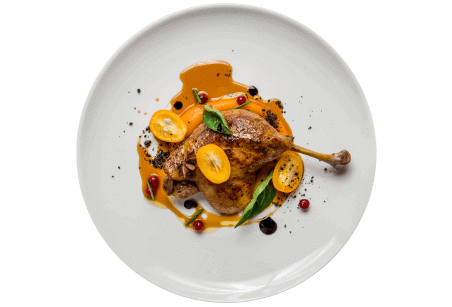
Instructors
Meet Your Escoffier Boulder Culinary Arts Chef Instructors
Your Boulder culinary degree journey starts here, guided by Chef Instructors that are passionate about helping you grow as a student and a professional. From food prep techniques to cooking skills, our instructors can provide a comprehensive and real-world culinary education.
Our Chef Instructors aren’t just teachers; they’re enthusiastic guides who can see potential in students. They know that reaching culinary goals is not just about learning techniques; it’s about creating a supportive learning environment. With personal encouragement and mentorship, they can help you set ambitious goals and confidently work towards culinary excellence.
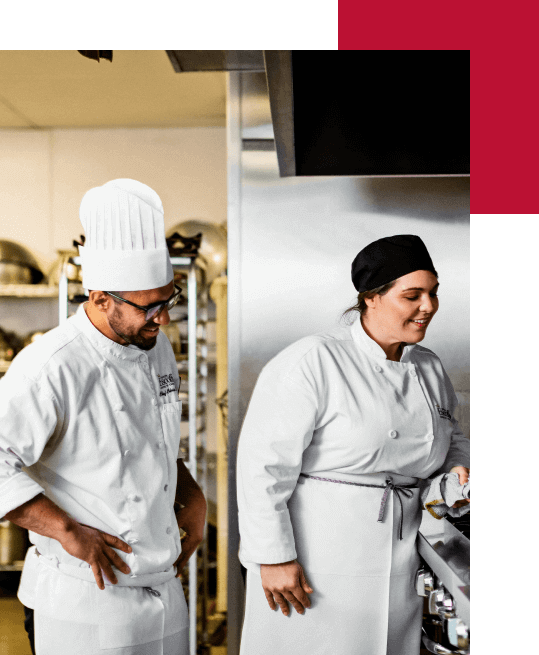
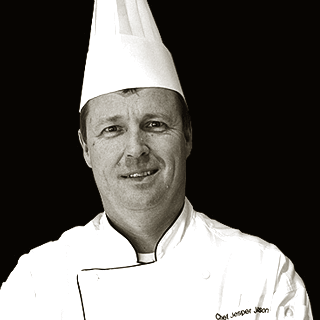
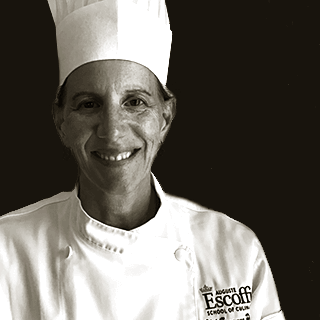
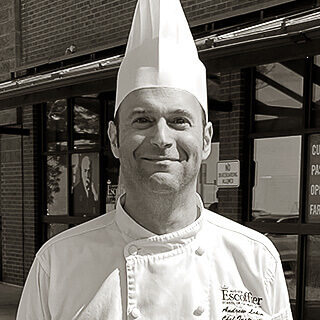
Colorado Career Outlook
Stand out in the culinary job market with an Escoffier Boulder culinary arts degree or diploma
Starting a journey towards a culinary arts degree in Boulder can unlocks a world of exciting and rewarding career opportunities. Our program has been carefully crafted to provide graduates with the skills and understanding necessary to be competitive in the ever-changing culinary landscape.
Our culinary arts programs can help you feel ready to step into sought-after positions in venues such as prestigious restaurants, resorts, and cruise ships. The extensive culinary arts curriculum spans from fundamental culinary skills to menu planning, providing you with the practical skills that you can apply to the culinary career you pursue.
12,700+
COLORADO RESTAURANT LOCATIONS
Colorado holds the fifth position in the country when it comes to the per capita quantity of restaurants.
The Colorado Restaurant Industry in 2023, Colorado Restaurant Association
Example Job Titles
- Recipe Developer
- Line Cook
- Catering Assistant
- Banquet Cook
- Garde-Manger
- Food Critic
- Food Stylist
- Roundsman
- Personal Chef
- Prep Cook
- Menu Planner
Example Boulder employers
- Fine Dining Restaurants
- Hotels & Resorts
- Catering Companies
- Cruise Lines
- Private Clubs
- Food Styling Agencies
- Food Trucks
- Resorts & Spas
- Retirement Communities
- Corporate Dining
- Supermarkets
EXPLORE CAREERS AND EXTERNSHIPS IN OUR CAREER CENTER WITH THE HELP OF OUR BOULDER CAREER SERVICES SPECIALISTS
Get “insider knowledge” on how you can uncover career opportunities with our employer partners.
Career Planning
Get clear on your goals and understand career options. Use your externship to explore and experiment.
Resume and Portfolio Assistance
Build a resume and portfolio that can catch the attention of employers in the niche where you’d like to work.
Interview Preparation
We can help you practice your interview skills to be ready for questions that come your way.
Admissions
Escoffier Boulder Admissions Requirements
To enroll at Escoffier Boulder and get started in the culinary arts program, you need a high school diploma or general equivalency diploma (GED). You do not need any specific work experience, nor do you have to take the ACT or SAT to be admitted to any program at Escoffier. For more information, see our catalog.
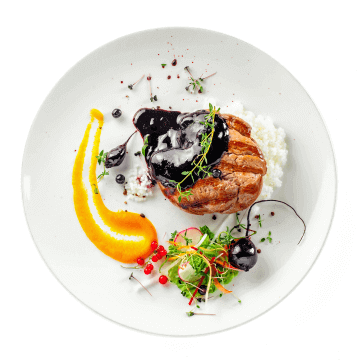
FAQs
Frequently Asked Questions About Our Boulder Culinary Arts Programs
How much does culinary school cost in Colorado?
Total program costs for the Diploma in Culinary Arts in Colorado is $18,094, and total program costs for the Associate of Occupational Studies Degree in Culinary Arts is $36,740.* See the costs for all programs.
*Total program cost includes tuition and equipment & supplies. The Associate of Occupational Studies Degree in Culinary Arts cost also includes course packs. The cost of books is not included. Students may choose to purchase books when enrolling. For more cost details, see the catalog.
Financial aid is available for those who apply and qualify. During the 2021-2022 academic year, the majority of first-time postsecondary education students at Escoffier who applied and qualified received some form of financial aid.
You can learn more about the financial aid process and speak with a financial advisor to help guide you through the process.
Is Auguste Escoffier School of Culinary Arts accredited in Colorado?
Auguste Escoffier School of Culinary Arts in Boulder, Colorado, holds national accreditation from the Accrediting Council for Continuing Education and Training (ACCET). We are also approved and regulated by the Colorado Department of Higher Education (CDHE), Division of Private Occupational Schools. Our Boulder campus is approved by CDHE to participate in the National Council for State Authorization Reciprocity Agreements (NC-SARA).
Additionally, our Diploma in Pastry Arts, Diploma in Culinary Arts, and Associate Degree in Culinary Arts programs (residential only) are accredited by the American Culinary Federation Educational Foundation Accrediting Commission.
How do I enroll in Escoffier’s culinary school in Colorado?
Enrolling in Escoffier’s culinary school in Colorado takes place on our convenient online platform and typically requires only about 10 minutes to complete the application.
Our guide “How You Can Get into Culinary School” can provide an overview of the steps that you may need to take to enroll in Escoffier. You can also reach out to the Admissions Department for assistance during the process. Applications are accepted continuously for programs, and students who submit their application materials early will have priority with selecting their top shift, date, and program.
To apply, you’ll need to provide the following:
- Your location and demographics
- Emergency contact information
- Program of interest
- Proof of graduation
- A valid driver’s license, passport, or photo I.D.
After completing the application, you’ll review and submit it, then receive an enrollment agreement packet through DocuSign.
This is also an opportunity to consult with the Student Finance Department to explore various financing options. Financial aid is available to those who apply and qualify, and many of our students utilize financing options to fund their education.
Is financial aid or scholarships available to attend culinary school in Colorado?
Yes! Financial aid is available to students who apply and qualify to attend Escoffier’s culinary school in Colorado.
In the academic year 2021-2022, the majority of first-time postsecondary education students received some form of financial assistance upon applying and qualifying.
If you’re a student, we encourage you to contact our Financial Aid Department to explore your eligibility for grants or federally-backed loans.
Scholarships are also available for online Escoffier students who apply and qualify, including Work & Learn Scholarships, the Student Veteran Scholarship, and merit-based scholarships.
Learn more about the scholarships that you may qualify for.
Do I need to be a Colorado resident to attend Escoffier’s culinary school in Boulder, CO?
No, students from almost anywhere in the world can attend culinary school at the Escoffier campus in Boulder, Colorado.
Do students at Escoffier’s Colorado culinary school get dorms or housing assistance?
At Escoffier, we understand that finding suitable housing is a crucial aspect of a student’s experience.
While we do not provide on-campus student housing, Escoffier has partnered with a select housing partner in Boulder, CO. Whether you’re looking for an apartment or dorm-style accommodation, our partners can assist you in finding a new home in Boulder.
You can get in touch with our housing services here. Our team can provide you with detailed information about available housing options and help you with your search.
Do I need a GED or high school diploma to go to Escoffier’s culinary school in Colorado?
To be considered for culinary programs at Auguste Escoffier School of Culinary Arts in Colorado, you need to have proof of high school graduation or equivalent. This must be obtained through one of the following prior to the expected start date:
- High school diploma or transcript
- High school equivalency exam: GED, HSED, HiSet, or TASC
- Documentation demonstrating that the student has passed a state-authorized examination that the state recognizes as the equivalent of a high school diploma
- Official college transcript from a completed Associate or higher degree program from an accredited institution
- 60 completed college semester credits or 90 completed college quarter credits from one accredited institution, or
- State-recognized homeschool certificate of completion
- Homeschool documentation as required by local and or state agencies, not limited to the following: notification to the required agency, academic transcripts, and proof of graduation
- DD-214 for U.S. veterans, which reflects high school equivalency
Are SAT scores required to attend Auguste Escoffier School of Culinary Arts in Colorado?
No, SAT scores are not required to attend Escoffier’s culinary school in Colorado.
What GPA do I need for Escoffier’s culinary school in Colorado?
GPA is not factored into the admissions decision for Escoffier’s culinary school in Colorado.
Does Escoffier have an online culinary school in Colorado?
Yes, Escoffier offers online culinary programs through our Boulder, CO campus, but it’s available to students around the world, including those students in Colorado.
Our programs include an online diploma in Culinary Arts and Operations, and an online Associate of Occupational Studies degree in Culinary Arts, both of which include a hands-on industry externship.
Online culinary school can be a flexible option for students with busy schedules or living far away from a ground campus.
Visit our online culinary arts program page to discover if online culinary school is right for you.
Is Escoffier the best culinary school in Colorado?
Ranked as one of the best culinary arts colleges in Colorado in 2024 by Niche, Escoffier’s campus in Boulder, Colorado stands out for its experienced chef instructors, detailed curriculum, and emphasis on sustainable, farm-to-table practices.
The curriculum, depending on the degree or diploma, covers many topics, including basic cooking, restaurant operations, menu design, business skills, and diverse culinary concepts.
In addition to its culinary arts programs, Escoffier’s culinary school in Colorado offers programs in baking and pastry arts and a diploma in plant-based cuisine.
Our programs also include hands-on industry externships which can provide valuable practical experience for students in a professional kitchen setting.
Escoffier’s culinary school in Colorado can be an excellent education option for those considering a career in the culinary industry.
Check out our article on what you need to know about culinary school at Escoffier to learn more about what makes our school stand out.
How much is Escoffier’s culinary school for Colorado residents?
Total culinary school program costs for Escoffier’s campus in Colorado are the same whether students are in-state Colorado residents, out-of-state, or international students.
Total program costs for the Diploma in Culinary Arts in Colorado is $18,094, and total program costs for the Associate of Occupational Studies Degree in Culinary Arts is $36,740.*
*Total program cost includes tuition and equipment & supplies. The Associate of Occupational Studies Degree in Culinary Arts cost also includes course packs. The cost of books is not included. Students may choose to purchase books when enrolling. For more cost details, see the catalog.
Financial aid is available for those who apply and qualify. You can learn more about the financial aid process and speak with a financial advisor to help guide you through the process.
How long does it take to complete culinary school in Colorado?
Our Colorado campus offers two culinary arts programs:
Diploma in Culinary Arts:
- Consists of 44 quarter credits, totaling 760 clock hours
- Curriculum spans 30 weeks to complete
Associate of Occupational Studies Degree in Culinary Arts:
- Requires 90 quarter credits, translating to approximately 1,340 clock hours
- The duration of the program is 60 weeks
- Completion of a specific diploma program may affect the timeline
Read more about the length of our programs here: How Long Does It Take to Finish Culinary School?
Note: All clock hours are based on average or expected time to complete an activity or category of activities. Some students may require more or less time to complete course requirements.
What culinary classes are taught at the Colorado campus?
At our Colorado campus, the Culinary Arts programs offer a diverse curriculum that can cater to various interests within the culinary field. The diploma program can provide students with foundational skills and specialized knowledge in areas like Culinary Foundations, where emphasis is placed on essential practices such as food safety and sanitation. It also features the Farm to Table® Experience, which can give students hands-on experience with food production from source to plate.
For those pursuing an Associate in Occupational Studies degree, the program can expand on these basics with additional courses like Restaurant Operations and Culinary Entrepreneurship, offering insights into the business and managerial aspects of the culinary world. This degree path also includes broader educational topics, such as the Science of Nutrition and World History & Culture from a Culinary Perspective, which can broaden a student’s understanding of the global culinary environment.
Both paths include a hands-on culinary industry externship, which can allow students to gain relevant work experience in approved food service establishments, which can be crucial for their professional development in the culinary industry. These structured programs are designed to provide a comprehensive educational experience that can help prepare students for various roles within the culinary field.
For a complete listing of all courses offered, please refer to the detailed course information provided higher up on this page.
How do I become a chef in Colorado?
A culinary arts education in Colorado can provide aspiring chefs with a solid foundation for a successful career in the culinary industry. While a culinary degree does not guarantee a job as a chef, it can equip individuals with the essential skills, knowledge, and hands-on experience needed to pursue a career in the field.
However, it’s important to note that a culinary education requires dedication, hard work, and perseverance. The coursework can be rigorous, and students will need to be able to handle the demands of a fast-paced kitchen environment. But for those who are passionate about cooking and have the drive to succeed, a culinary education can be a rewarding experience that starts the path to a fulfilling career as a chef.
In addition to an education, aspiring chefs should also pursue hands-on experience in a professional kitchen working under a mentor and continuous learning.
Additionally, culinary school graduates in Colorado can have the advantage of working in a state with a thriving culinary scene. Colorado is home to a diverse range of top restaurants, from fine dining establishments to casual eateries, as well as a number of food festivals and events. This can provide culinary professionals with ample opportunities to find employment and grow their careers.
You can explore more information in these helpful articles:
Which culinary degree is best for high paying chef jobs in Colorado?
The best culinary degree for high-paying chef jobs in Colorado can vary based on individual career goals and the employer’s criteria at the specific culinary establishment. No degree can guarantee you a head chef position your first month out of school, but you might find yourself on a starting path to such culinary success with a degree in your back pocket.
Two prominent options offered at Escoffier’s Colorado campus are the Diploma in Culinary Arts and the Associate in Occupational Studies Degree in Culinary Arts — both which may present valuable opportunities for pursuing a career path as a chef.
Diploma in Culinary Arts:
- This program can offer a concentrated education on culinary techniques and skills, and could provide a solid foundation for aspiring chefs.
- The shorter duration may allow individuals to enter the workforce more quickly, potentially leading to earlier income-generating opportunities.
- Graduates of the Diploma program can consider employment in a variety of entry-level culinary positions in establishments such as restaurants, hotels, and catering companies.
Associate in Occupational Studies Degree in Culinary Arts:
- This comprehensive program encompasses a broader range of courses, including the science of nutrition, professional communication, restaurant operations, and entrepreneurship.
- Graduates of the Associate degree program can consider employment in entry-level and potentially management positions in the culinary industry.
Ultimately, the choice between the Diploma and Associate degree depends on individual career aspirations and preferred learning paths. For those seeking a quicker entry into the workforce, the Diploma program may be a suitable option. Conversely, those aiming for leadership and management roles in the future may benefit from the more in-depth education provided by the Associate degree program.
Does a culinary school count as a college in Colorado?
The definition of a college or “culinary college” is open to interpretation and there is not a singular definition of how the term is applied in Colorado.
At Escoffier, we feel that our type of accredited, skills-based programs can be considered culinary trade school.
Not all colleges and universities are accredited, and neither are all trade or technical schools. Escoffier’s Boulder, Colorado campus is an accredited, degree-granting institution.
Read more about whether culinary school is considered a college.
Note: Auguste Escoffier School of Culinary Arts in Boulder, Colorado is nationally accredited by the Accrediting Council for Continuing Education and Training (ACCET).
It is also approved and regulated by the Colorado Department of Higher Education (CDHE), Division of Private Occupational Schools. Auguste Escoffier School of Culinary Arts (Boulder, CO) has been approved by CDHE to participate in the National Council for State Authorization Reciprocity Agreements (NC-SARA).
The Diploma in Pastry Arts, Diploma in Culinary Arts, and Associate Degree in Culinary Arts (residential only) programs are accredited by the American Culinary Federation Educational Foundation Accrediting Commission.
Is Culinary School considered a trade school in Colorado?
While the definition may vary, culinary schools can be considered trade schools in Colorado. Trade schools, also known as vocational schools or career schools, focus on providing practical skills and training for specific trades or professions. Culinary schools in Colorado can fit into this category.
Many students are drawn to this trade school approach because it can typically offer a shorter completion timeline compared to many traditional colleges. This can enable graduates to join the workforce more quickly with industry-specific expertise.
If you are interested in learning more about the trade school distinction, check out our article: Is Culinary School Considered a Trade School?
Does Escoffier’s Colorado culinary school provide job placement opportunities after graduation?
Escoffier’s culinary school in Colorado can help students with job search assistance after graduation. The Career Services team can help provide counseling, and tools to help students achieve their career goals and find employers that fit their professional aspirations.
All students at Auguste Escoffier School of Culinary Arts receive Career Services assistance both during their time in school and after graduation.
At our career center, students at the Colorado campus can get access to specialized tools to help them with career building, including: career planning assistance, resume and portfolio assistance, and interview preparation.
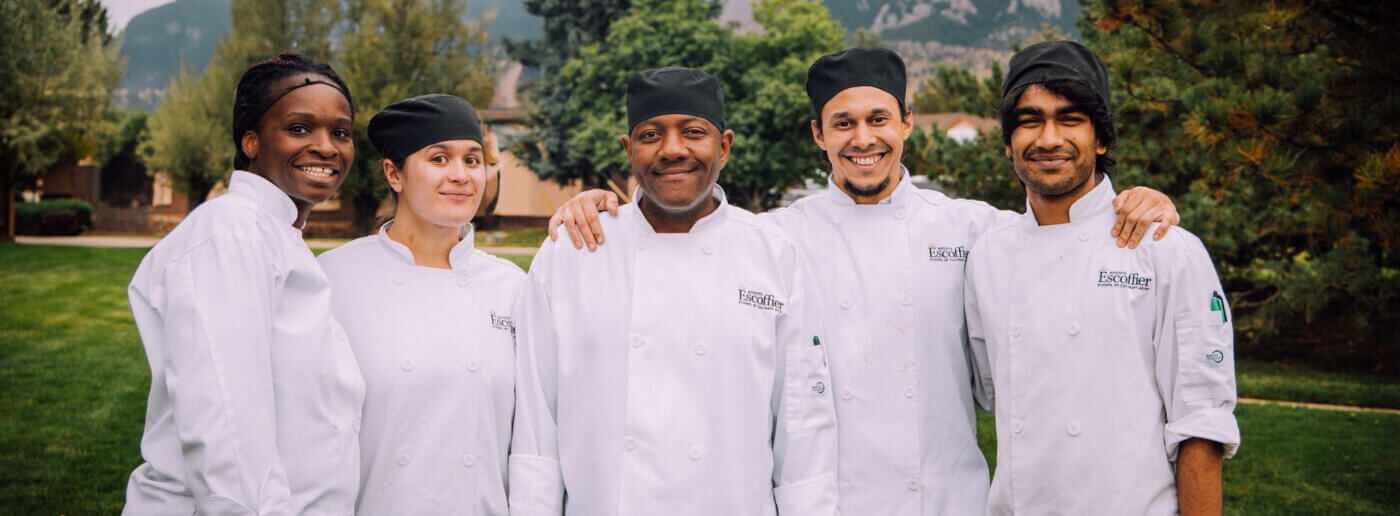
Explore the exciting culinary hub of Escoffier Colorado

